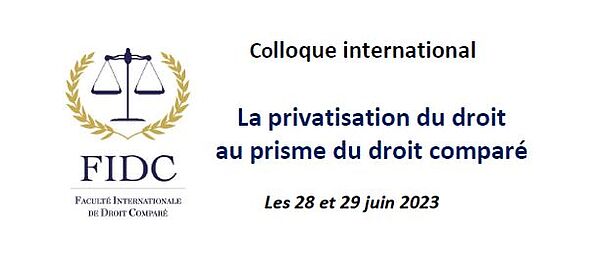Organizers
- Juliette Lelieur - Professor at University of Strasbourg, Dean of the international Faculty of comparative law
- Kansu Okyay - Doctor in comparative international law, University of Strasbourg
- Silvain Vernaz - Doctor in comparative criminal law, University of Strasbourg
About
In the past sources of law essentially had a public origin: legal norms were created by states or by regional or international organizations. Today, however, law is being privatized as norms of private origin begin to emerge. Private actors powerful enough to compete with states and agile enough to respond more quickly to scientific and technical discoveries and societal changes (mostly economic), are producing the norms they consider appropriate.
Private norms are forward looking, whether they are codes of conduct, ethical charters, corporate compliance rules, sports rules, or those governing cryptocurrencies. These norms can be designed to protect the rights and integrity of individuals as well as to ensure compliance with social and environmental ethics in the business world. They can be defined as standards relating to goods or rules of behavior. Issued by non-state actors, they may be binding in the sphere in which they apply.
Private norms are emerging in many sectors and all legal orders. Because they vary widely, however, it is difficult to posit a comprehensive theory that would allow us to understand them as a whole. To some extent, they are the "black holes" of our contemporary legal systems: objects of law that are difficult to detect even though they are substantive and produce concrete effects.
While many private norms (such as rules governing social networks or corporate social responsibility) apply across borders, we propose to study the phenomenon of privatization of law through a comparative approach. We aim to examine this little-known and insufficiently theorized phenomenon from different perspectives and thus achieve a better understanding of private norms, their advantages and disadvantages, and the dangers that may pose to the balance within a legal system.
As part of this study, we plan to identify the different categories of private norms. At a formal level, what are the different instruments on which private norms are based (private regulation, practice, etc.)? In addition to the private origin, would it be possible to identify a common process for developing some of these norms? Does the adoption of these private norms sometimes result from a state obligation? At a substantive level, are there other criteria or characteristics that can be used to more accurately describe private norms?
The next step is to focus on the value of private norms. The aim is to understand how these norms become part of the legal system and their complex relationship with the public norms: are private norms independent of public legal systems or must they be incorporated into a public norm, such as a European directive or a national law, in order to exist in law? Can they be applied by national or international courts or only by private bodies such as arbitral tribunals?
Finally, it is necessary to examine the issues raised by the privatization of law. Private norms are no longer limited to regulating small sectors. Moreover, they are gradually becoming objects of transnational regulation. What influence do these norms have on the internationalization of law, that is, the creation of norms that apply beyond national borders? What hope does the emergence of private transnational norms hold for us? Is it legitimate to grant normative power to a private actor? What dangers might that pose, particularly in terms of democratic balance?
The colloquium will be held on Wednesday June 28th 2023 from 14h and Thursday June 29th 2023 (full day) in Alex Weill room - Faculty of Law, Political Science and Management (University of Strasbourg).
Indications
Characteristics of the oral contributions:
- The paper should compare at least two legal systems (national or international)
- The presentation should not last more than 20-25 minutes
- Language: English or French
For applications, please attach:
- A description of one or two pages on how the presentation fits into the proposed theme and contributes to the scientific debate
- A short biography of the author (5-10 lines)


